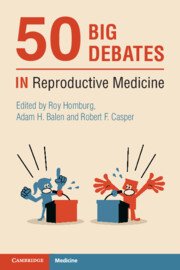Book contents
- 50 Big Debates in Reproductive Medicine
- Series page
- 50 Big Debates in Reproductive Medicine
- Copyright page
- Contents
- Contributors
- Foreword
- Introduction
- Section I Limits for IVF
- Section II IVF Add-ons
- Section III The Best Policy
- Section IV Embryology
- Section V Ethics and Statistics
- 30A Sex Selection Should Be Permitted for Family Balancing
- 30B Sex Selection Should Be Permitted for Family Balancing
- 31A Reproductive Medicine Should Be Publicly Funded
- 31B Reproductive Medicine Should Be Publicly Funded
- 32A Gamete Donation Should Be Anonymous
- 32B Gamete Donation Should Be Anonymous
- 33A Uterus Transplantation Is a Step Too Far
- 33B Uterus Transplantation Is a Step Too Far
- 34A Meta-analysis Should Not Be Considered Class A Evidence
- 34B Meta-analysis Should Not Be Considered Class A Evidence
- Section VI Male-factor Infertility
- Section VII Genetics
- Section VIII Ovarian Stimulation
- Section IX Hormones and the Environment
- Index
- References
33A - Uterus Transplantation Is a Step Too Far
For
from Section V - Ethics and Statistics
Published online by Cambridge University Press: 25 November 2021
- 50 Big Debates in Reproductive Medicine
- Series page
- 50 Big Debates in Reproductive Medicine
- Copyright page
- Contents
- Contributors
- Foreword
- Introduction
- Section I Limits for IVF
- Section II IVF Add-ons
- Section III The Best Policy
- Section IV Embryology
- Section V Ethics and Statistics
- 30A Sex Selection Should Be Permitted for Family Balancing
- 30B Sex Selection Should Be Permitted for Family Balancing
- 31A Reproductive Medicine Should Be Publicly Funded
- 31B Reproductive Medicine Should Be Publicly Funded
- 32A Gamete Donation Should Be Anonymous
- 32B Gamete Donation Should Be Anonymous
- 33A Uterus Transplantation Is a Step Too Far
- 33B Uterus Transplantation Is a Step Too Far
- 34A Meta-analysis Should Not Be Considered Class A Evidence
- 34B Meta-analysis Should Not Be Considered Class A Evidence
- Section VI Male-factor Infertility
- Section VII Genetics
- Section VIII Ovarian Stimulation
- Section IX Hormones and the Environment
- Index
- References
Summary
Uterus transplantation involves a vascularised composite allograft for women with absolute uterine factor infertility, and is considered research. It requires a large medical and surgical multidisciplinary team, requires adequate psychological support and risks premature birth in the offspring. We compare it with the alternative of surrogacy, with the pros and cons regarding the prospective parents and offspring, the parental project collaborators, whether dead or live uterine donor or the gestating surrogate, and society at large. The possible aspects of cross-border reproductive care are also considered before concluding that it is still ‘a step too far’.
- Type
- Chapter
- Information
- 50 Big Debates in Reproductive Medicine , pp. 169 - 170Publisher: Cambridge University PressPrint publication year: 2021

